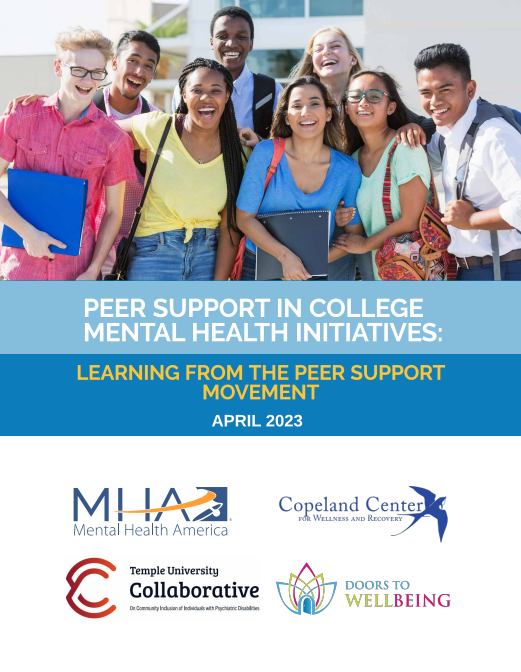About our youth mental health reports
Mental Health America’s Youth Leadership reports capture the invaluable insights and recommendations of youth voices. Young people aren’t just the subject of our reports – they’re also authors, collaborators, and contributors shedding light on youth mental health issues while inspiring and guiding the efforts led by youth nationwide.
Our reports have appeared in The New York Times, NPR, Inside Higher Ed, WHSV-TV, and The San Diego Union-Tribune. They have been used to create policy and advocacy priorities, including updating federal regulations on mental disability-related discrimination and national and state school mental health policies.
Featured reports
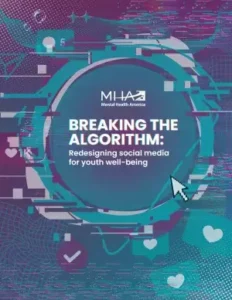 Breaking the algorithm: Redesigning social media for youth well-being
Breaking the algorithm: Redesigning social media for youth well-being
This report dives deep into how social media is impacting young people’s mental health, relationships, and daily lives. Born from the Breaking the algorithm summit and research project, this initiative was led and co-created by young people every step of the way, with insights from over 900 survey respondents, focus groups with young people, and conversations with our youth co-researchers.
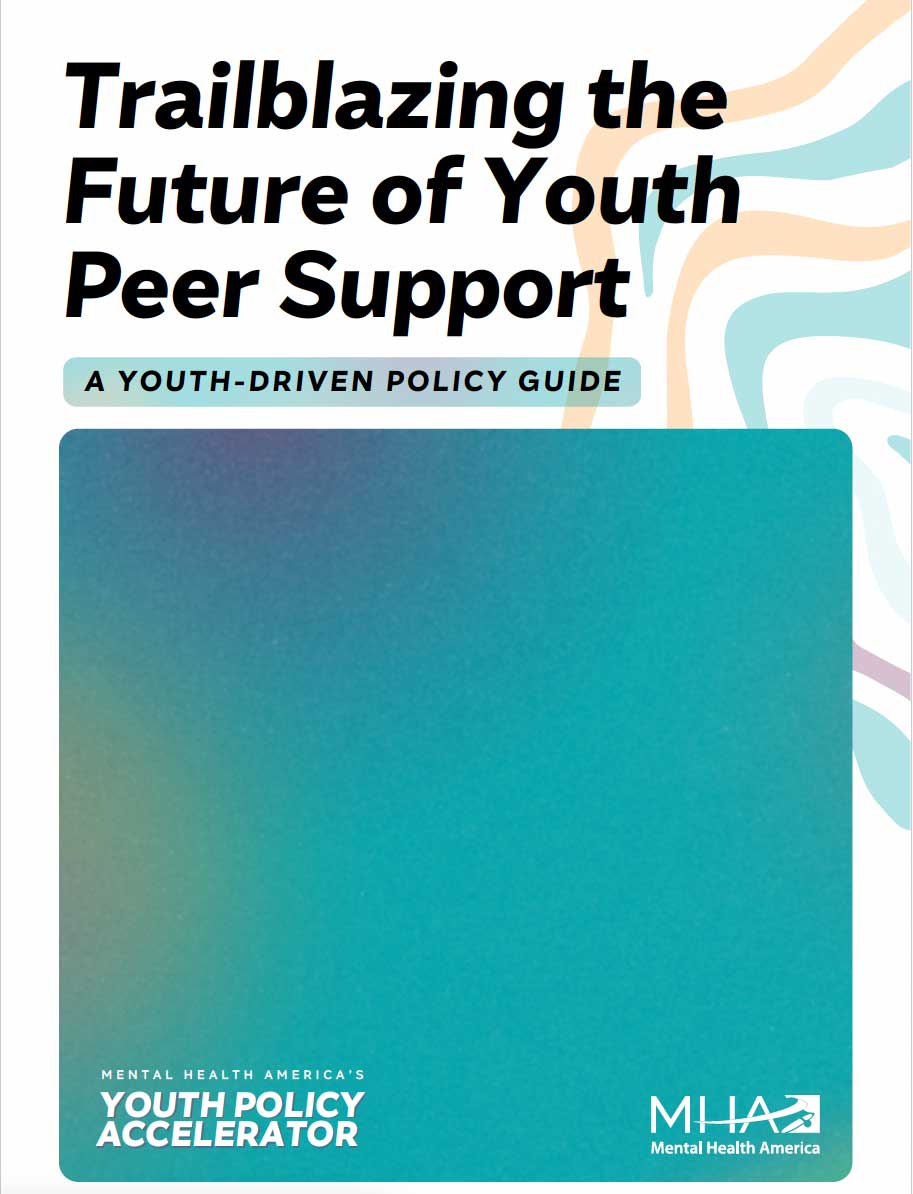 Trailblazing the Future of Youth Peer Support: A Youth-Driven Policy Guide
Trailblazing the Future of Youth Peer Support: A Youth-Driven Policy Guide
In response to widespread increases in mental health distress among young people, youth leaders have stepped up to help their peers and drive policy change. Peer support is a key youth priority for promoting young people’s mental health and well-being.
This report, co-authored by MHA’s inaugural Youth Policy Accelerator members, highlights the perspectives of young leaders and how we can drive national change. It features policy progress, results from a survey of more than 350 youth peer leaders, and actionable recommendations for national policymakers.
Download Trailblazing the Future of Youth Peer Support report or executive summary
Past Lessons, Future Insights: An intergenerational approach to youth mental health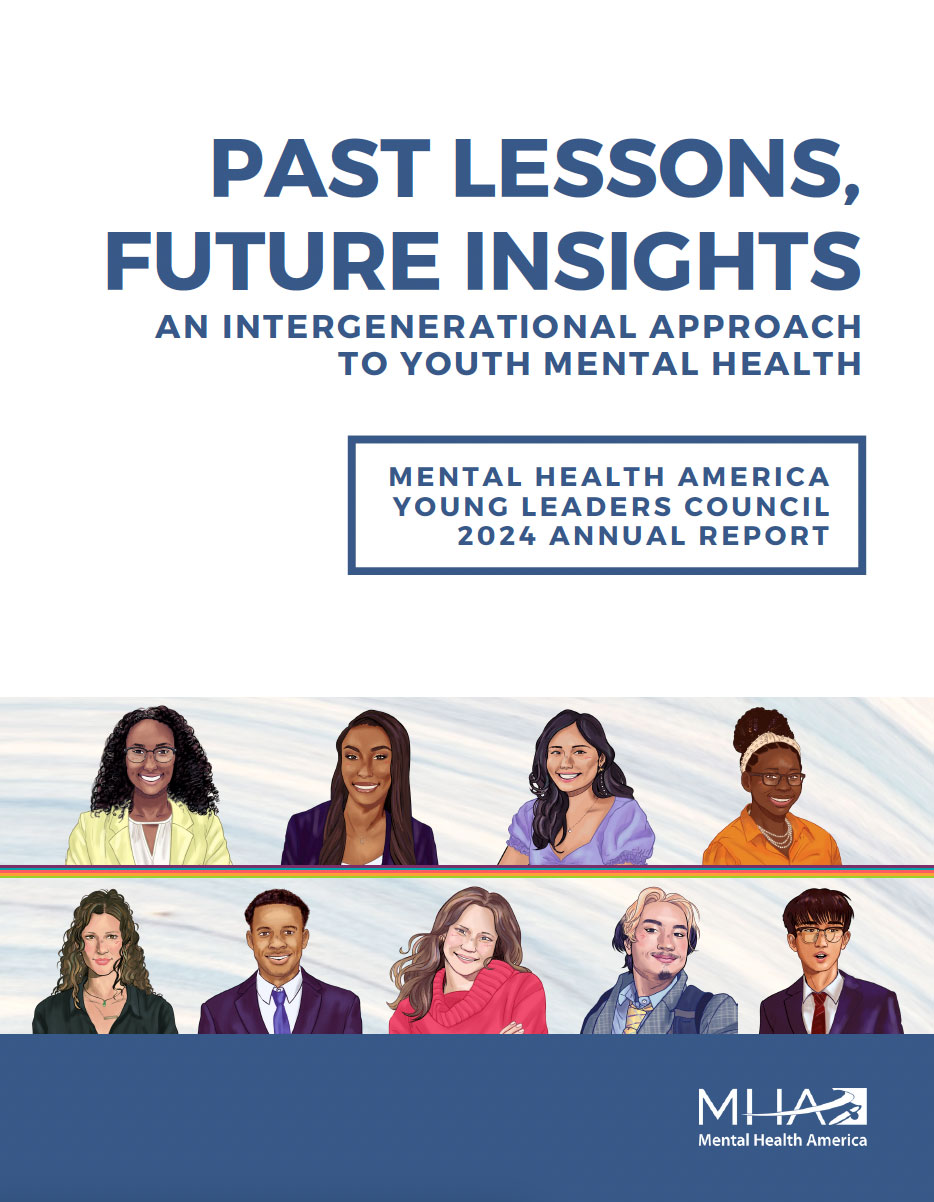
The 2024 MHA Young Leaders Council annual report, Past Lessons, Future Insights: an Intergenerational Approach to Youth Mental Health, is based on interviews conducted by the council with individuals who lived through historical crises such as the AIDS epidemic, China’s Cultural Revolution, and 9/11 and the War on Terror. These conversations offer insights into how past experiences of collective trauma and resilience can inform today’s youth mental health advocacy, calling for both systemic action and intergenerational collaboration to support young people’s mental well-being.
What You’ll Find in the Report:
- Intergenerational interviews and knowledge sharing: Personal narratives detailing experiences of collective trauma and resilience – and the lessons learned in the process.
- Recommendations for addressing youth mental health: Key takeaways for supporting youth mental health, informed by interview findings and the work of the YLC.
- Model programs and guidance from YLC members: Detailed descriptions of successful mental health initiatives, with advice for fellow youth advocates to implement similar programs in their own communities.
Peer Support in College Mental Health Initiatives: Learning from the Peer Support Movement
Students need more mental health support, and campus peer programs are an essential part of the solution. While campus administrators’ concerns about peer programs are well documented, the experiences of students are rarely highlighted and often lack connection to the decades of expertise from the mental health peer support movement.
To address this gap, we surveyed and interviewed leaders and students in college mental health peer support programs. This paper combines these findings with foundational resources from the greater peer support movement to address student-identified issues like training, sustainability, and protecting students’ rights.
Download Peer Support in College Mental Health Initiatives report
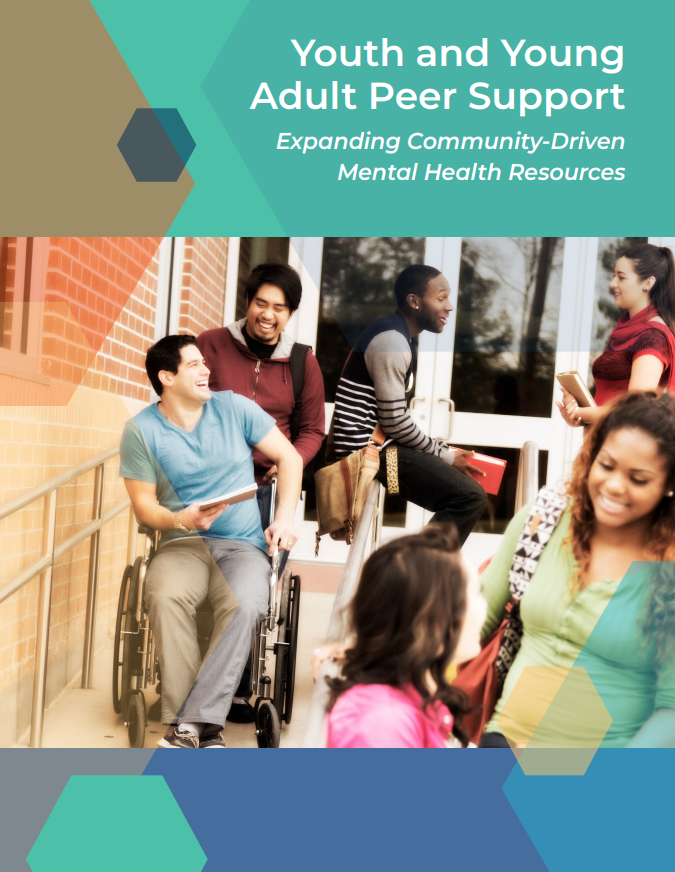
Youth and Young Adult Peer Support: Expanding Community-Driven Mental Health Resources
With support from Well Being Trust, this paper is a call to invest in a full continuum of youth peer support to address the growing youth mental health crisis.
The report explores the shortcomings of existing approaches, contrasted with effective practices that enable young people to support one another – including shared language, creative expression, and youth peer specialist services. We offer example programs, recommendations, barriers, and key considerations in advancing youth peer support.
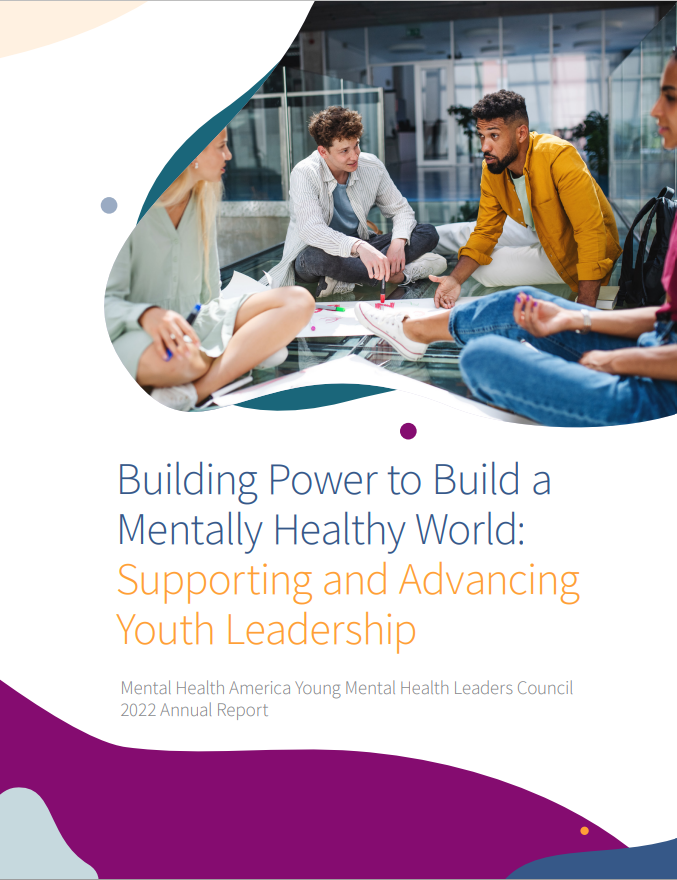
Building Power to Build A Mentally Healthy World: Supporting and Advancing Youth Leadership
Youth voices are essential to addressing the current mental health crisis, yet young people’s perspectives and ideas are often dismissed. Power imbalances mustbe understood and shifted to build long-lasting, sustainable, and systemic change.
This report from MHA’s 2021-2022 Young Leaders Council provides guiding recommendations for creating youth leadership programs that support youth as people, in relationships, and as part of larger social change ecosystems.
Download Building Power to Build a Mentally Healthy World report
Our reports in the news
To solve the youth mental health crisis, stop looking to adults
When youth are brought in and supported, real and meaningful change happens
Teens are advocating for mental health days off school
Faced with high stress levels among adolescents and a mental health crisis that includes worsening suicide rates, some states are now allowing students to declare a mental health day.
Why aren’t more students seeking mental health support?
Many students who need resources aren’t receiving them, but colleges can take some key steps to lower the barrier.
College-aged students are facing barriers to accessing mental health services
A new report from Mental Health America shows college students face barriers when trying to access services for mental health.
Explore all past reports
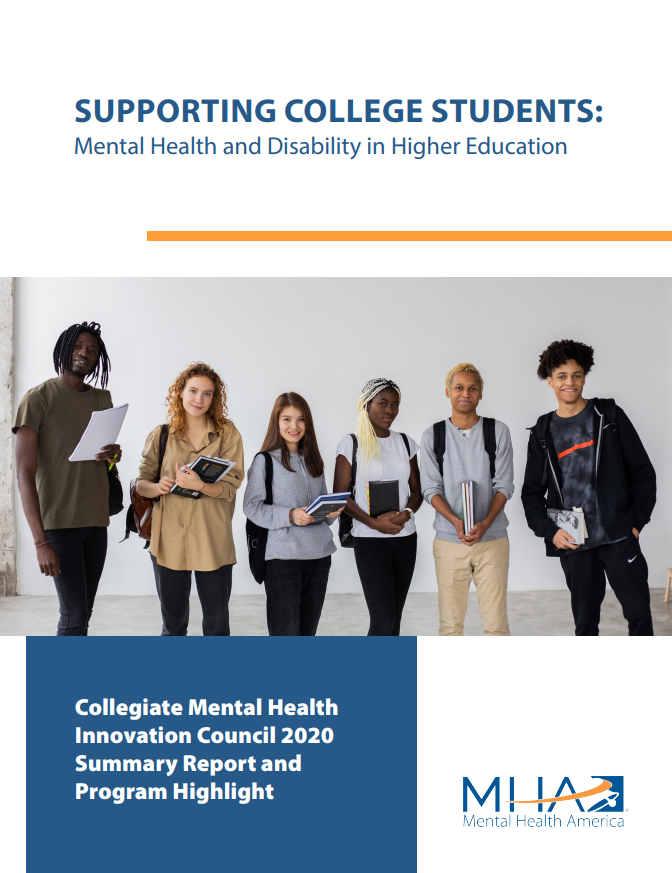
Supporting College Students: Mental Health And Disability in Higher Education
Despite growing attention to well-being and mental health conditions in higher education, conversations and recommendations often exclude students with mental health disabilities.
This paper from MHA’s 2019-2020 Collegiate Mental Health Innovation Council offers recommendations for campuses to improve accessibility for students with mental health disabilities. It highlights themes including the absence of disability education on college campuses, inaccessible accessibility services, and barriers to the use of disability accommodations.
Download Supporting College Students report
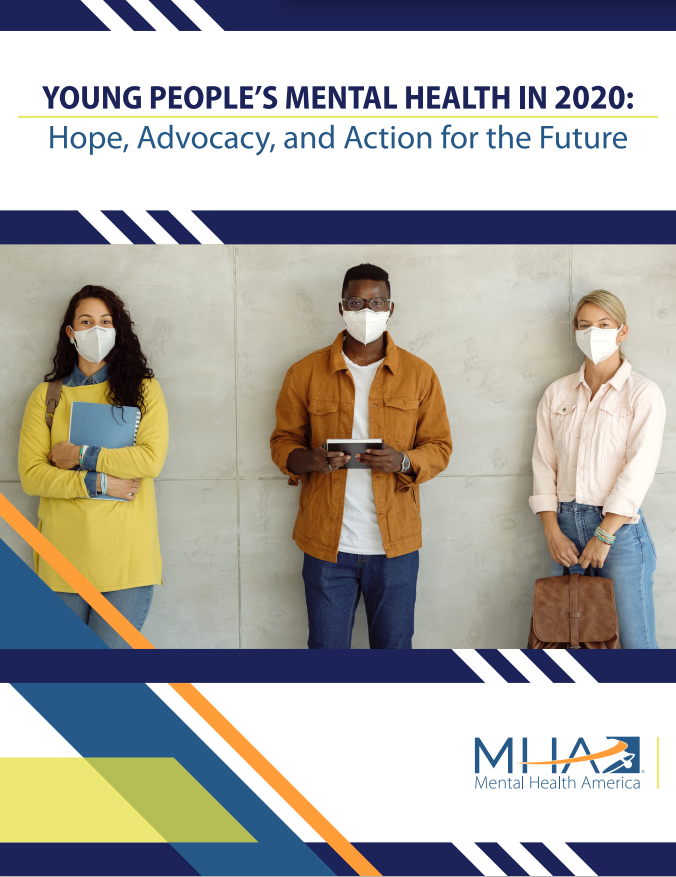
Young People’s Mental Health in 2020: Hope, Advocacy, and Action for the Future
There was already a mental health crisis among young people when their lives were disrupted by COVID-19. The pandemic’s health impact was compounded by the political environment and racial reckoning in the U.S.
This report provides an analysis of young people’s wants, hopes for the future, and goals for mental health resources and advocacy in a year of unprecedented large-scale crises. The report shares the perspectives of 1,906 young survey respondents and provides examples of youth-driven programs that respond to the needs they identified.
Download Young People‘s Mental Health in 2020 report
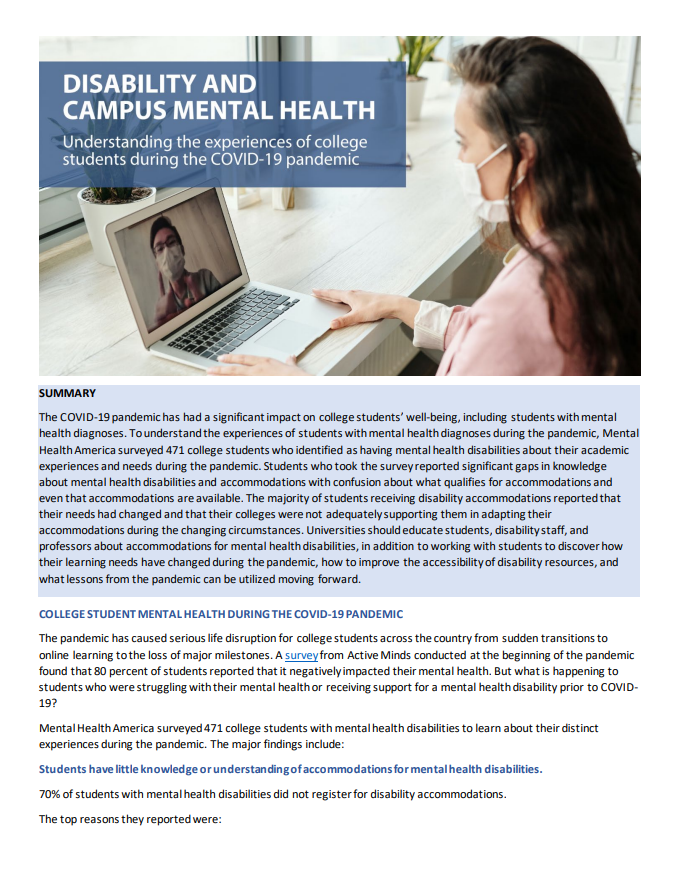
2020 Disability and Campus Mental Health Report
The COVID-19 pandemic had a significant impact on college students’ well-being, including students with mental health diagnoses.
To understand the experiences of students with mental health diagnoses during the pandemic, Mental Health America surveyed 471 college students who identified as having mental health disabilities about their academic experiences and needs during this time.
Download Disability and Campus Mental Health report
The 2018-2019 CMHIC Report: Making Space for Mental Health on Campus
This report from MHA’s 2018-2019 Collegiate Mental Health Innovation Council emphasizes how schools and students can make mental health resources more accessible by building them into the everyday lives of students and the places where they want to be.
Download Making Space for Mental Health report
The 2017-2018 CMHIC Report: Beyond Awareness: Student-led Innovation in Campus Mental Health
The report from MHA’s 2017-2018 Collegiate Mental Health Innovation Council focuses on the power of student leadership in disability supports, peer support, and technology in campus mental health. It includes summaries of youth-driven programs that can be expanded upon and replicated on other campuses.
